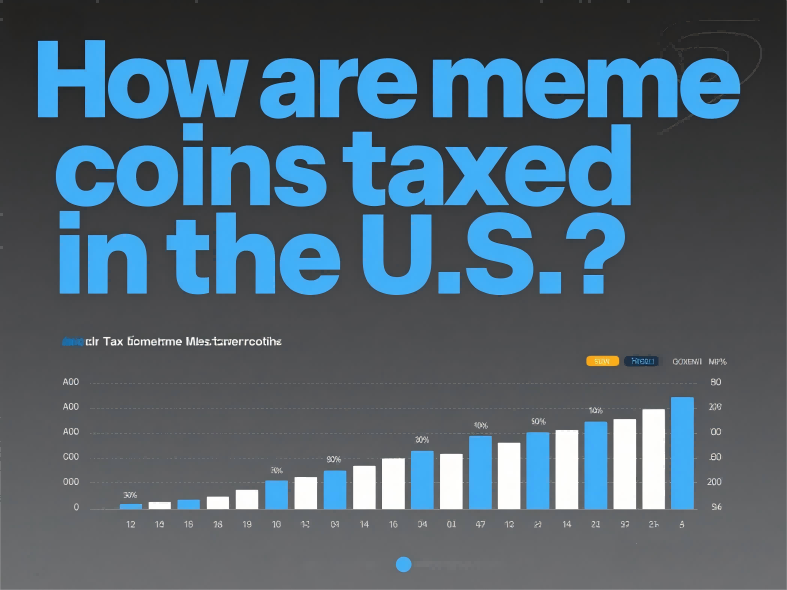“In crypto trading, the IRS is watching—meme coins included.”
For many investors, meme coins are a wild ride of viral hype, overnight gains, and sometimes equally fast losses. But no matter how funny the name or how unexpected the price spike, the U.S. tax code treats meme coins as seriously as Bitcoin or Ethereum. If you’ve ever traded Dogecoin, Shiba Inu, or one of the countless new meme coins, you might be wondering: how does Uncle Sam see it? Let’s break it down in a way that makes sense for traders, investors, and anyone trying to stay on the right side of the taxman.

In the eyes of the IRS, meme coins aren’t “just memes.” They’re digital assets—taxable property, the same as utility tokens or even stocks. That means whenever you sell, swap, or even spend a meme coin, you may be creating a taxable event.
For example, let’s say you bought $500 worth of Dogecoin and later sold it for $2,000 during a rally. That $1,500 profit is a capital gain and must be reported. Whether it’s taxed as short-term or long-term depends on how long you held it. Short-term gains (under one year) are taxed at your regular income rate, while long-term gains (over a year) can qualify for lower rates.
Many traders assume they only owe taxes when cashing out into dollars, but that’s not true. A taxable event can occur in several ways:
Imagine swapping Shiba Inu for Ethereum—on paper, that’s like selling one stock to buy another. Even if you never touched fiat currency, the IRS still expects you to record the gain or loss.
Meme coins are notoriously volatile, which makes record-keeping even more important. A coin you bought in May could double in value overnight or lose 90% in a week. For traders juggling multiple meme coins alongside assets like forex pairs, commodities, or indices, using tracking software is not optional—it’s essential.
Tools that integrate with decentralized exchanges and wallets can help keep track of every transaction, even those involving obscure meme tokens. The more accurate your records, the smoother tax season will be.
The taxation of meme coins mirrors that of stocks and commodities, but the pace feels more like forex trading. Just as a forex trader navigates rapid currency swings, meme coin holders ride market sentiment driven by social media.
Utility tokens often tie their value to actual platform use, giving traders more stable reference points. Meme coins, in contrast, live and die by hype cycles, which can lead to more frequent taxable events if you’re actively trading. This means traders using leverage or CFDs must be extra mindful, as gains (and losses) stack up fast.
Navigating meme coin taxes isn’t just about compliance; it’s about strategy. A few practical approaches include:
These strategies echo the discipline of professional traders in forex or options markets: it’s not just about making money, but keeping it.
As decentralized finance grows, the lines between meme coins, utility tokens, and traditional assets are blurring. Smart contracts may one day automate tax tracking at the wallet level, while AI-driven tools could flag taxable events in real time. The challenge is that regulation often lags behind innovation, leaving traders to bridge the gap.
Still, the trend is clear: meme coins might start as jokes, but they live within a serious financial system. Staying compliant now means you’ll be ready when future frameworks—whether AI-powered tax reporting or blockchain-native compliance tools—become standard.
“Trade the hype, report the gains—because the IRS memes are no joke.”
At the end of the day, meme coins can be thrilling to trade, but taxes turn hype into responsibility. By approaching meme coins with the same mindset you’d use for forex, stocks, or commodities, you set yourself up not just to enjoy the ride, but to keep your profits intact. In crypto, knowledge isn’t just power—it’s protection.
Spot trading is straightforward: you buy an asset like Bitcoin, Tesla stock, or gold, and you profit if the price goes up
Read MoreTrading has always carried an air of possibility. The idea of turning a well-timed decision into a life-changing profit a
Read MoreStart your CFD trading
Your All in One Trading APP PFD